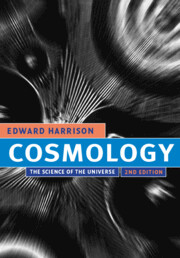Book contents
- Frontmatter
- Contents
- Preface
- Introduction
- PART I
- PART II
- 10 Curved space
- 11 Special relativity
- 12 General relativity
- 13 Black holes
- 14 Expansion of the universe
- 15 Redshifts
- 16 Newtonian cosmology
- 17 The cosmic box
- 18 The many universes
- 19 Observational cosmology
- PART III
- Appendix – Fundamental quantities
- Index
16 - Newtonian cosmology
from PART II
Published online by Cambridge University Press: 05 June 2012
- Frontmatter
- Contents
- Preface
- Introduction
- PART I
- PART II
- 10 Curved space
- 11 Special relativity
- 12 General relativity
- 13 Black holes
- 14 Expansion of the universe
- 15 Redshifts
- 16 Newtonian cosmology
- 17 The cosmic box
- 18 The many universes
- 19 Observational cosmology
- PART III
- Appendix – Fundamental quantities
- Index
Summary
All are but parts of one stupendous whole.
Alexander Pope (1688–1744), An Essay on ManSTATIC NEWTONIAN UNIVERSE
Until the 20th century everybody believed that the universe is naturally static: not expanding and not contracting. Even Albert Einstein, after the discovery of general relativity, continued to hold this belief for several years.
In the late 17th century, belief in a static order remained unshaken when Newton advanced the theory of universal gravity. In response to a question in a letter from the young clergyman Richard Bentley (Chapter 3), Newton wrote in reply that in an infinite universe it would be impossible for all matter to fall together and form a single large mass, but “some of it would convene into one mass and some into another, so as to make an infinite number of great masses, scattered at great distances from one to another throughout all that infinite space.”
The Newtonian theory of universal gravity, in which all bodies attract one another, reinforced the growing belief that the universe must be edgeless and therefore infinite. For if the universe were finite and bounded by a cosmic edge, it would have a center of gravity, and the attraction between its parts would cause it, said Newton, to “fall down into the middle of the whole space, and there compose one great spherical mass.” This argument led him finally to abandon the finite Stoic cosmos in favor of the infinite Atomist universe.
- Type
- Chapter
- Information
- CosmologyThe Science of the Universe, pp. 323 - 338Publisher: Cambridge University PressPrint publication year: 2000



